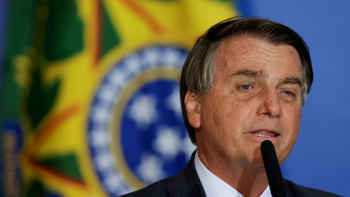End of the Bolsonaro Era: What the World Can Learn from Brazil

With a sliver of sanity realising the urgent need for damage control, Brazilians have voted out their most dangerous populist leader: the science-denying, environment-damaging, guns-and-threats-embracing, president Jair Bolsonaro. The bombshell return of their leftist former President, Luiz Inacio Lula da Silva – who was freed from prison once corruption charges against him were annulled last year – is one to celebrate, mostly as it symbolises an end to Brazil's worst nightmare. And because it means one less deranged leader in the world, sprouting lurid nonsense into thin air.
Lula's win marks the most significant example yet of Latin America hurtling to the left since 2018, with the election of Andres Manuel Lopez Obrador in Mexico. It is an anti-incumbent fervour – usually ignited by frustration with far-right wing leaders – that has caused this shift. While there are challenges for these new governments facing a bleak economic future, it is more so a cautionary tale for Europe, very much entrenched in the claws of surging far-right party power. There's a lot to learn, to debate and reflect, on Brazil's divorce from Bolsonaro. But the unspooling of Bolsonaro's viselike grip over Brazil will require a long, hard process of ideological cleansing.
If recent history has taught us anything, it's that far-right extremism, once benched in the presidential chair, is hard to shuffle back to the fringes. It creates a cult of people with an all-consuming devotion to a single fascist leader. The anti-democratic stance that Bolsonaro has taken for the past four years is now cemented into the nation's backbone. The fact that Bolsonaro lost the race by a thin margin – garnering 49.1 percent of the vote to Lula's 50.9 percent – in the tightest race since Brazil's return to democracy, is itself proof enough.
Leaders across the world swiftly welcomed the former President Lula, but Bolsonaro remained suspiciously – or expectedly – silent, which sparked widespread premonition regarding whether Bolsonaro would even give up his seat. After two days, he finally spoke out in a brief two-minute speech, ambiguously stating that he will "continue to follow all the commandments of our constitution." His chief of staff indicated his administration will begin the transition of power, while Bolsonaro himself didn't concede or acknowledge his opponent's win, much like the notorious Donald Trump, who he openly admires.
Yet, he did continue to egg on his hardcore supporters who have taken to the streets, using trucks and tires to block key highways to contest the election results. The post-election protests, Bolsonaro said, represented the "indignation and a feeling of injustice about how the electoral process played out." Many of his supporters in the protests – much like Trump devotees who still ridiculously believe the US democratic elections had been rigged – hurled claims that Brazil's election had been fraudulent. Some Bolsonaro supporters even called for military intervention, demanding Congress and the Supreme Court be dissolved immediately.
This tactic of repeatedly brainwashing the public to doubt democracy itself is not unfamiliar in the playbook of far-right extremism. Prior to the election results, when he figured his chances of winning were slim, Bolsonaro began incessantly casting doubts on voting machines as "rife with fraud" – without any credible evidence, and against the evidence existing to validate that Brazil's voter machine system is hard to tamper with. Brazil's elections saw their social media turn into a wild misinformation-firing machine, with a "direct role" from Bolsonaro, according to a document from the federal police.
Brazil's journey of freeing itself from its Bolsonaro era will be one for the history books, or given the current state of global politics, it'll emulate something like a cringy daily reflection journal: of what not to do, again and again. The first lesson would be the same as when Biden beat Trump – the dangers of electing far-right extremist leaders, only so the next four years tumble into a mad-show of how low a nation could go.
Bolsanaro, a former army captain, came into power, stripping enforcement measures to protect the Amazon, cutting spending for science, firing environmental experts and pushing to weaken indigenous land rights with his development at all costs approach to the economy. Chiming the infamous theory that vaccines have nanobots, Bolsanaro's Brazil arguably had the worst pandemic response, killing approximately 688,000 people in a failed bid to achieve herd immunity, while also creating new variants, such as the P1, endangering more people as it spread to other countries.

Under his leadership, Brazil, the former poster child for conservation, saw their environment ravaged as Bolsonaro rolled back legal protections, with the Amazon alone facing nearly double the deforestation since 2018, even as Bolsonaro infamously put it, "Amazon cannot catch fire." Now that we know it can indeed catch fire, here's what the world's largest rainforest will gain from Bolsonaro's loss: an analysis by the climate website Carbon Brief suggests that if Bolsonaro loses to Lula, annual deforestation in the Brazilian Amazon could be down by nearly 90 percent by the end of the decade.
Months nearing the election, it became clear that ousting him was an absolute necessity for Brazil. The elections came down to a binary of sorts: those for, and those against Bolsonaro. It is this unity, in a polarising table, that led to the narrow victory of Lula da Silva. This sort of unity against a leader or party is a trend that follows after the regime damages civic life to its last straw. We've seen it with Trump. To say what we're seeing in the masses gathered at BNP rallies in Bangladesh mirrors this same dynamic, is not too far-fetched either.
If anything, Brazil's elections should be a wake-up call for Europe, espousing more far-right extremism, with the newly elected Italy's Giorgio Meloni and her far-right Brothers of Italy party, while Hungary and Poland continue to be run by far-right politicians untethered from economic reality.
But for some of us, like Bangladesh, we don't even have that division of far-right and left-wing discussion to gauge a wake-up call or lesson from Brazil. For one, Brazil had other options against Bolsonaro. They could only oust Bolsonaro with a fair electoral system, and a solid electronic voting system. In Bangladesh, we are too deep in our own Bolsonaro era. Too deep to perhaps get out. But we can watch Brazil for now, as they dive into undoing a devastating legacy of a fascist leader and restore their semblance of sanity as a nation. Maybe then, we too can vicariously find some ourselves.
Ramisa Rob is a journalist at The Daily Star.

 For all latest news, follow The Daily Star's Google News channel.
For all latest news, follow The Daily Star's Google News channel. 









Comments